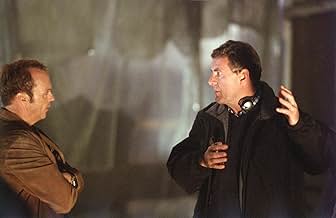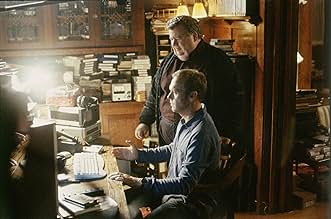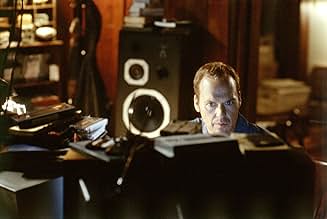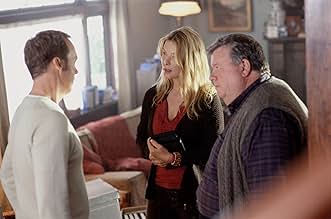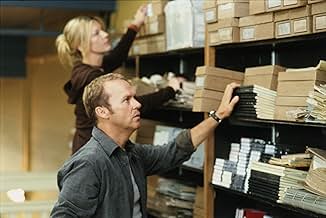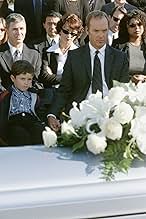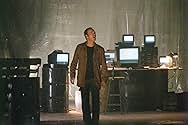AVALIAÇÃO DA IMDb
5,5/10
52 mil
SUA AVALIAÇÃO
O desejo de um arquiteto de falar com sua esposa além da morte torna-se uma obsessão com repercussões sobrenaturais.O desejo de um arquiteto de falar com sua esposa além da morte torna-se uma obsessão com repercussões sobrenaturais.O desejo de um arquiteto de falar com sua esposa além da morte torna-se uma obsessão com repercussões sobrenaturais.
- Prêmios
- 1 vitória e 2 indicações no total
Avaliações em destaque
What a shame it is when a potentially captivating and refreshingly low-key story manages to latch onto your interest at the start and then gradually lets you down further and further until you're left scratching your mystified head by the time it reaches its overdone conclusion. Unfortunately, this is what happened to me by the end of WHITE NOISE.
It wasn't Michael Keaton's fault; it was a pleasure to see him return as the star of a brand new movie once again, looking a bit wrinkled perhaps, but still managing to give a strong and sincere performance. As a man whose wife has recently died, he becomes obsessed with her wandering spirit in the afterlife (not a new idea), apparently getting contacted by her through that funky electrical fuzz business you see on your television screen when there's nothing being broadcast.
The idea of spirits communicating via the airwaves is called EVP (Electronic Voice Phenomena) and there are a lot of people who actually believe in it for real, so I'm not going to make any comments about what I think of that, or them. Let me just say that I'm all for suspension of disbelief when it comes to buying into fantastic films like this, but what I can't tolerate is not understanding what the hell was supposed to be taking place, which is about where I was left stranded when the credits finally began to roll. Much static indeed.
There are occasionally movies like this that have me completely baffled, but if a film fails to make itself clear for me, I tend to consider that to be the fault of the filmmaker, not my own (unless I watched it while I was too tired to focus or something). Well, for WHITE NOISE I was wide awake, bright-eyed and bushy-tailed -- so guess who's to blame?
It wasn't Michael Keaton's fault; it was a pleasure to see him return as the star of a brand new movie once again, looking a bit wrinkled perhaps, but still managing to give a strong and sincere performance. As a man whose wife has recently died, he becomes obsessed with her wandering spirit in the afterlife (not a new idea), apparently getting contacted by her through that funky electrical fuzz business you see on your television screen when there's nothing being broadcast.
The idea of spirits communicating via the airwaves is called EVP (Electronic Voice Phenomena) and there are a lot of people who actually believe in it for real, so I'm not going to make any comments about what I think of that, or them. Let me just say that I'm all for suspension of disbelief when it comes to buying into fantastic films like this, but what I can't tolerate is not understanding what the hell was supposed to be taking place, which is about where I was left stranded when the credits finally began to roll. Much static indeed.
There are occasionally movies like this that have me completely baffled, but if a film fails to make itself clear for me, I tend to consider that to be the fault of the filmmaker, not my own (unless I watched it while I was too tired to focus or something). Well, for WHITE NOISE I was wide awake, bright-eyed and bushy-tailed -- so guess who's to blame?
Michael Keaton gives a good performance as architect Jonathan Rivers. I found the movie good and thrilling at times but it somehow lost its phase in the end. But then again that's also the case with many films like Timecop and Hard Cash.
Storywise the movie was quite good. The idea of a device which can record our personalities after death is quite interesting. A quote by Thomas Edison made in 1928, which is used in the beginning of the movie, states: "Nobody knows whether our personalities pass on to another existence or sphere, but if we can evolve an instrument so delicate as to be manipulated by our personality as it survives in the next life such an instrument ought to record something." The concept of E.V.P.; (Electronic Voice Phenomenon) is elaborated on through the entire movie and it leaves us still thinking.
The directing and the way it's written holds up pretty good up until about 2/3 in the movie. The characters and Michael's acting as a father is quite good and not flawed in any way. The story flows in a good and convincing way. But it's in the end where it starts to get a little hectic. There's a twist to the story which sorta destroys the original set up and it becomes a tad....well dull and inconsistent to be perfectly blunt.
But all in all this is an enjoyable film. Just don't expect to be blown away.
Storywise the movie was quite good. The idea of a device which can record our personalities after death is quite interesting. A quote by Thomas Edison made in 1928, which is used in the beginning of the movie, states: "Nobody knows whether our personalities pass on to another existence or sphere, but if we can evolve an instrument so delicate as to be manipulated by our personality as it survives in the next life such an instrument ought to record something." The concept of E.V.P.; (Electronic Voice Phenomenon) is elaborated on through the entire movie and it leaves us still thinking.
The directing and the way it's written holds up pretty good up until about 2/3 in the movie. The characters and Michael's acting as a father is quite good and not flawed in any way. The story flows in a good and convincing way. But it's in the end where it starts to get a little hectic. There's a twist to the story which sorta destroys the original set up and it becomes a tad....well dull and inconsistent to be perfectly blunt.
But all in all this is an enjoyable film. Just don't expect to be blown away.
Jonathan Rivers (Michael Keaton) is a successful architect. His wife, Anna (Chandra West) is an even more successful novelist. When Anna goes missing one night, they fear she is dead. Suddenly, an odd man named Raymond Price (Ian McNeice) shows up and tells Jonathan that his wife has been trying to contact him from "the other side", via Electronic Voice Phenomena (EVPs). Rivers also gradually gets wrapped up in EVPs, which lead him to some unusual situations and the heart of a mystery.
I had a very divided reaction to White Noise. Some aspects were excellent, but in many ways, the film had potential that was never actualized. There are also some flaws that kept drawing me out of the film's universe. Overall I felt the film worked, but probably not as writer Niall Johnson and director Geoffrey Sax intended.
Let's talk about what the film did right first. The major assets, as mentioned in the title of my review, were the production/set design, cinematography and overall atmosphere. The latter largely hinges on the first two. The production/set design and cinematography were nearly perfect. Everything was focused on the idea of white noise, especially the most well known visual depiction of white noise--television "static" or "snow". The credits introduced a motif of jarring intrusions of white noise, which occasionally recurred throughout the film (although perhaps not enough). There were clever instantiations of a visual "white noise" theme in the sets, such as the outside waterfall on the lower level of Jonathan's apartment building, and the wall of glass blocks inside his apartment. The color scheme was white, silver and blue, washed out so that the film had an almost black and white feel. There were also more abstract references to white noise, such as the running water motif (water dynamics are mathematically chaotic, as is white noise, which is also thought of as being literally random), and the arcing electricity. All of this combined to provide a wonderful, gloomy atmosphere, and in another film, would easily compensate for any minor flaws to bring the film up to a 10.
However, there are a number of problems with White Noise. Keaton's performance was the major sticking point for me. He seems aloof and brooding throughout the entire film. While that may have been perfect for Batman, it doesn't work for me here. Both McNeice and Deborah Kara Unger (as Sarah Tate) were fine, but their roles were minor enough to not be able to carry the film. I usually like Keaton a lot, and I can't say that I dislike him here, but his performance is very odd and off-putting.
Another problem was the pacing. For a long time, White Noise may as well have been a realist drama. While that's fine for other films, it also doesn't tend to work in a horror/thriller. The only directors I've seen really able to pull that combination off effectively are Alfred Hitchcock and M. Night Shyamalan. It takes so long to get to the horror/thriller part of the story that many people likely either lose interest by that point, or they're interested because they'd rather see a realist drama, and the more supernatural ending will be unsatisfying for them. The pacing also doesn't fit with the white noise/chaos motif. This is a film that should have been edited like a Michael Bay vehicle.
Finally, I had a number of problems with the story. One, there are quite a few superfluous elements (such as Jonathan's son). Two, although I'm not someone who usually complains about genre combinations, there was an attempt to make White Noise both a "benevolent spirit" story, ala Ghost (1990) and a Ring (2002)-like otherworldly threat. The two just didn't meld. Three, the thriller aspect, which enters primarily at the climax of the film, seems too tacked on to engender an appropriate emotional reaction from the audience. And four, the supernatural aspects and especially the "twist revelation" of the ending are very rushed and unpleasantly ambiguous, possibly in an attempt to hide the fact that the plot in these respects wasn't very well thought out. There is a tremendous amount of potential in the script, and it is entertaining enough to marginally recommend, but this seems more like an early draft that was rushed to completion, or possibly a film that suffered a lot of studio meddling.
The bottom line is that while there are enough positive elements to make White Noise worth a watch to serious genre fans and students of film-making, do not expect the story to grab you by the short and curlies, and do not expect much of a resolution. Enjoy the film primarily for its visuals. I'm generously rating the film a 7 out of 10.
I had a very divided reaction to White Noise. Some aspects were excellent, but in many ways, the film had potential that was never actualized. There are also some flaws that kept drawing me out of the film's universe. Overall I felt the film worked, but probably not as writer Niall Johnson and director Geoffrey Sax intended.
Let's talk about what the film did right first. The major assets, as mentioned in the title of my review, were the production/set design, cinematography and overall atmosphere. The latter largely hinges on the first two. The production/set design and cinematography were nearly perfect. Everything was focused on the idea of white noise, especially the most well known visual depiction of white noise--television "static" or "snow". The credits introduced a motif of jarring intrusions of white noise, which occasionally recurred throughout the film (although perhaps not enough). There were clever instantiations of a visual "white noise" theme in the sets, such as the outside waterfall on the lower level of Jonathan's apartment building, and the wall of glass blocks inside his apartment. The color scheme was white, silver and blue, washed out so that the film had an almost black and white feel. There were also more abstract references to white noise, such as the running water motif (water dynamics are mathematically chaotic, as is white noise, which is also thought of as being literally random), and the arcing electricity. All of this combined to provide a wonderful, gloomy atmosphere, and in another film, would easily compensate for any minor flaws to bring the film up to a 10.
However, there are a number of problems with White Noise. Keaton's performance was the major sticking point for me. He seems aloof and brooding throughout the entire film. While that may have been perfect for Batman, it doesn't work for me here. Both McNeice and Deborah Kara Unger (as Sarah Tate) were fine, but their roles were minor enough to not be able to carry the film. I usually like Keaton a lot, and I can't say that I dislike him here, but his performance is very odd and off-putting.
Another problem was the pacing. For a long time, White Noise may as well have been a realist drama. While that's fine for other films, it also doesn't tend to work in a horror/thriller. The only directors I've seen really able to pull that combination off effectively are Alfred Hitchcock and M. Night Shyamalan. It takes so long to get to the horror/thriller part of the story that many people likely either lose interest by that point, or they're interested because they'd rather see a realist drama, and the more supernatural ending will be unsatisfying for them. The pacing also doesn't fit with the white noise/chaos motif. This is a film that should have been edited like a Michael Bay vehicle.
Finally, I had a number of problems with the story. One, there are quite a few superfluous elements (such as Jonathan's son). Two, although I'm not someone who usually complains about genre combinations, there was an attempt to make White Noise both a "benevolent spirit" story, ala Ghost (1990) and a Ring (2002)-like otherworldly threat. The two just didn't meld. Three, the thriller aspect, which enters primarily at the climax of the film, seems too tacked on to engender an appropriate emotional reaction from the audience. And four, the supernatural aspects and especially the "twist revelation" of the ending are very rushed and unpleasantly ambiguous, possibly in an attempt to hide the fact that the plot in these respects wasn't very well thought out. There is a tremendous amount of potential in the script, and it is entertaining enough to marginally recommend, but this seems more like an early draft that was rushed to completion, or possibly a film that suffered a lot of studio meddling.
The bottom line is that while there are enough positive elements to make White Noise worth a watch to serious genre fans and students of film-making, do not expect the story to grab you by the short and curlies, and do not expect much of a resolution. Enjoy the film primarily for its visuals. I'm generously rating the film a 7 out of 10.
White Noise is a film that takes a true scientific phenomenon, and makes a film out of it. The phenomenon is one which involves electronic recording/broadcast equipment. In amongst white-noise (that crackle and hiss you get on a blank recording) and static on untuned TV reception there are voices and images discernible. Sometimes these voices have been clear enough to work out, and many people believe they are the voices and images of those who have died, trying to contact the living.
In the film, Michael Keaton plays Jonathan Rivers, an estate agent who loses his wife. When he is approached by Raymond, a man who lost his son years ago and claims he has heard from Jonathan's wife, it draws him into the phenomenon, and pretty soon he becomes obsessed, recording his own tapes and viewing/listening to them for messages. Then, suddenly, the messages become clear, and seem to be premonitions. Can he decipher the meaning of the messages, or will he disturb something best left alone? I was uncertain going into the film what to expect. Too many times the film world have come up with a great concept, but failed to deliver anything more than mediocre when it is a horror subject. Expecting another Godsend, I was pleasantly surprised to find a pretty good film, with some nice touches, and chills. Admittedly the story wouldn't look out of place on X-Files, but unlike the recent The Forgotten, it manages to feel complete, and doesn't seem to take the easy option at the end.
The direction by Sax (best know for his TV work such as Tipping the Velvet, Dr Who, Clocking Off, and Spitting Image to name a few) is more than sufficient, and he uses the white-noise to great effect. A little buzz here, and flicker there all serve to unnerve, and you could be forgiven for thinking you are watching another Japanese adaptation. There are a lot of similarities to eastern horror throughout, the use of silence the unnerve, the distorted images in the TV sets, and so on. Only the occasion "music to let you know you should jump" lets down the tone.
Nevertheless, with a well woven script which doesn't pander to the lowest denominator, and a sterling performance from Michael Keaton, who hasn't really had a presence on the screen since 1998s Jack Frost, make this an enjoyable little movie which deserves a viewing or two.
In the film, Michael Keaton plays Jonathan Rivers, an estate agent who loses his wife. When he is approached by Raymond, a man who lost his son years ago and claims he has heard from Jonathan's wife, it draws him into the phenomenon, and pretty soon he becomes obsessed, recording his own tapes and viewing/listening to them for messages. Then, suddenly, the messages become clear, and seem to be premonitions. Can he decipher the meaning of the messages, or will he disturb something best left alone? I was uncertain going into the film what to expect. Too many times the film world have come up with a great concept, but failed to deliver anything more than mediocre when it is a horror subject. Expecting another Godsend, I was pleasantly surprised to find a pretty good film, with some nice touches, and chills. Admittedly the story wouldn't look out of place on X-Files, but unlike the recent The Forgotten, it manages to feel complete, and doesn't seem to take the easy option at the end.
The direction by Sax (best know for his TV work such as Tipping the Velvet, Dr Who, Clocking Off, and Spitting Image to name a few) is more than sufficient, and he uses the white-noise to great effect. A little buzz here, and flicker there all serve to unnerve, and you could be forgiven for thinking you are watching another Japanese adaptation. There are a lot of similarities to eastern horror throughout, the use of silence the unnerve, the distorted images in the TV sets, and so on. Only the occasion "music to let you know you should jump" lets down the tone.
Nevertheless, with a well woven script which doesn't pander to the lowest denominator, and a sterling performance from Michael Keaton, who hasn't really had a presence on the screen since 1998s Jack Frost, make this an enjoyable little movie which deserves a viewing or two.
I first heard about White Noise when I saw the TV advert. Before then I didn't even know it existed. I watched the trailer online and decided that I would go and see it. Now being a fan of films like The Sixth Sense, I thought that this film would give me everything I wanted. It has Michael Keaton in it, and he rocks. Unfortunately the film did not deliver. It tried to be another Sixth Sense or Stir of Echoes, and failed miserably. It has a very promising start, but the middle just drags on repeating itself, and ends with a completely poor twist which any monkey could have figured out. Unfortunately like most "Scary" films nowadays it relies on loud noises and bangs to make the audience jump. This film could have been so much more. It's a shame because it was a good idea.
Você sabia?
- CuriosidadesThe EVP recording from the trailer ("I will see you no more") that is attributed to a woman named Ruth Baxter, who died in 1987, is supposedly a recording from Point Lookout, a "haunted" lighthouse in Maryland, made by an EVP researcher named Sarah Estep. The lighthouse was used as a hospital during the Civil War, and some interpretations of the recording believe it to say, "I was seeing the war", or "I was seeing the water". While the recording is said to be authentic by the AAEVP, the Ruth Baxter story is fictional.
- Erros de gravaçãoThough the story is set in Washington, the filmmakers make no attempt to conceal British Columbia licence plates.
- Citações
Raymond Price: [after John hears a ghost cursing at them] There are some very bad people out there. They can't all be Anna.
- Cenas durante ou pós-créditosThe opening of the film starts with: "Nobody knows whether our personalities pass on to another existence or sphere, but if we can evolve an instrument so delicate to be manipulated by our personality as it survives in the next life such an instrument ought to record something..." Thomas Edison 1928 E.V.P.; (Electronic Voice Phenomenon) The recording of voices and images of the dead, using de-tuned receiving apparatus. Identified in 1939, and now the subject of increasing scientific research worldwide, to finally evidence communication with the deceased.
- ConexõesFeatured in WatchMojo: Top 10 Movies That Will Make You Paranoid (2015)
- Trilhas sonorasBurn Away
Written and Performed by Ray O'Donnell, Liam Carty and Fran Carlyon
Principais escolhas
Faça login para avaliar e ver a lista de recomendações personalizadas
- How long is White Noise?Fornecido pela Alexa
- Is this a true story?
Detalhes
Bilheteria
- Orçamento
- US$ 10.000.000 (estimativa)
- Faturamento bruto nos EUA e Canadá
- US$ 56.386.759
- Fim de semana de estreia nos EUA e Canadá
- US$ 24.113.565
- 9 de jan. de 2005
- Faturamento bruto mundial
- US$ 91.196.419
- Tempo de duração1 hora 41 minutos
- Cor
- Mixagem de som
- Proporção
- 2.35 : 1
Contribua para esta página
Sugerir uma alteração ou adicionar conteúdo ausente

Principal brecha
By what name was Vozes do Além (2005) officially released in India in English?
Responda

